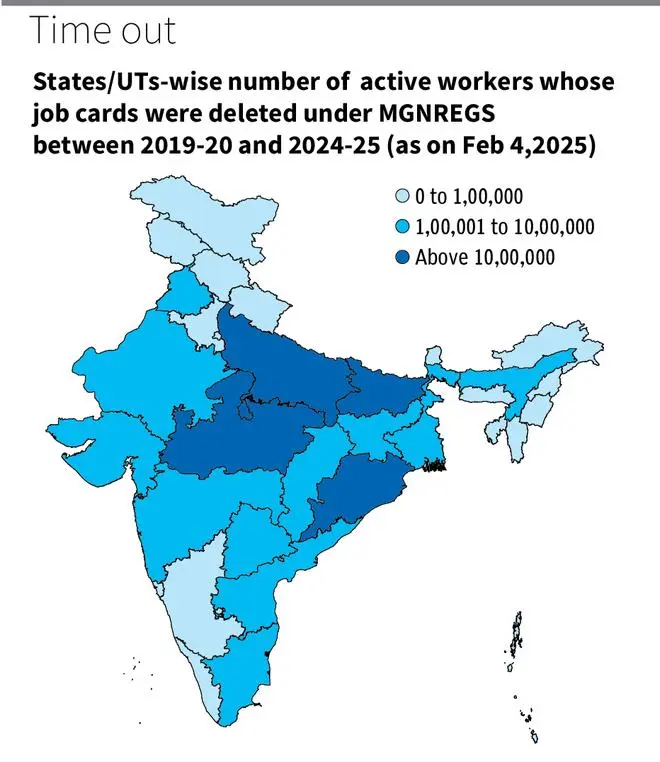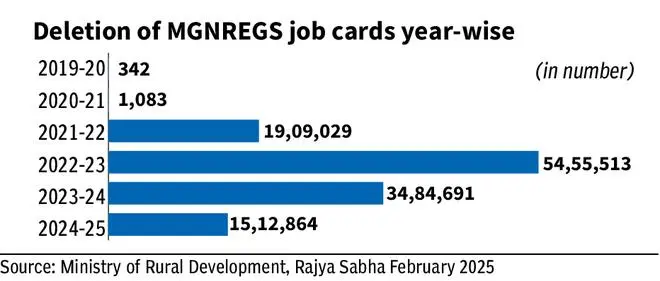
A file photo of MGNREGA workers at Purulia, West Bengal. | Photo Credit: DEBASISH BHADURI
In a clean-up drive under the Mahatma Gandhi National Rural Employment Guarantee Scheme (MGNREGS), over 1.23 crore job cards of active workers were deleted between 2019-20 and 2024-25 (as of February 2025), with Madhya Pradesh, Uttar Pradesh, Bihar and Odisha alone accounting for 61 per cent of these deletions. From fake and duplicate entries to families shifting out of rural areas, the purge reveals deep-rooted structural issues and administrative challenges that continue to haunt India’s largest rural employment scheme — even two decades after its launch.
According to data presented by the Ministry of Rural Development in the Rajya Sabha in February, a total of 1,23,63,522 job cards were deleted across various States. The primary reasons for deletion included fake, duplicate, or incorrect job cards; families permanently shifting out of the gram panchayat; and reclassifying certain gram panchayats as urban areas. Other reasons are individuals unwilling to work, job cards with only one member who is now deceased, among others.

Over the last six years, Madhya Pradesh accounted for the highest number of job card deletions under the MGNREGS, with 23,83,704 deletions — representing 19 per cent of the total deletions nationwide. Uttar Pradesh followed with 19,16,636 deletions (16 per cent), while Bihar ranked third with 18,35,735 deletions (15 per cent). Odisha reported 13,44,169 deletions, comprising 11 per cent of the national total.
In contrast, larger States such as Uttarakhand, Kerala, Himachal Pradesh and Haryana reported less than one per cent of the total deletions. Similarly, Punjab, Maharashtra and Jammu & Kashmir each accounted for only one per cent of the total job card removals.
To bring greater transparency and accountability, the Ministry of Rural Development issued a standard operating procedure (SOP) in January 2025 for all States and Union Territories. The SOP outlines clear guidelines for both deletion and restoration of job cards. It mandates the publication of draft deletion lists, verification through gram sabhas, and provision of an appeal mechanism for affected workers. Additionally, it requires linking of job cards with Aadhaar to prevent duplication and fraud, aiming to curb misuse while safeguarding genuine beneficiaries.
The data reveal that in 2019-20, only 342 job cards of active workers were deleted, of which 339 were from Ladakh and three from Telangana. The following year (2020-21), 1,083 deletions were reported, again with Ladakh accounting for 1,033 of them.
However, a significant shift occurred in 2021-22 when the government intensified its campaign to weed out fake, duplicate, and incorrect job cards, as well as those belonging to families that had permanently migrated or where gram panchayats were reclassified as urban. As a result, 19,09,029 active job cards were deleted in 2021-22, followed by a massive 54,55,513 deletions in 2022-23 — a period that coincided with the Covid-19 pandemic. In 2023-24, another 34,84,691 job cards were deleted, and in the current financial year (up to February 4, 2025), 15,12,864 deletions have already taken place.

Despite ongoing efforts, the persistence of fake job cards remains a major concern. The Lok Sabha Standing Committee on Rural Development and Panchayati Raj (2023-24) highlighted that the existence of fake job cards has continued to undermine the intent and effectiveness of MGNREGA.
Describing it as “an open secret,” the Committee observed that “rogue elements” at the grassroots level continue to exploit loopholes, often in collusion with others, to carry out fraudulent activities. The Committee emphasised the need for technological solutions to tackle the issue effectively. It recommended the use of smart cards, biometric identification, or other robust systems deemed practical and secure by the Ministry to prevent forgery and duplication.
Published on April 11, 2025

Comments
Comments have to be in English, and in full sentences. They cannot be abusive or personal. Please abide by our community guidelines for posting your comments.
We have migrated to a new commenting platform. If you are already a registered user of TheHindu Businessline and logged in, you may continue to engage with our articles. If you do not have an account please register and login to post comments. Users can access their older comments by logging into their accounts on Vuukle.